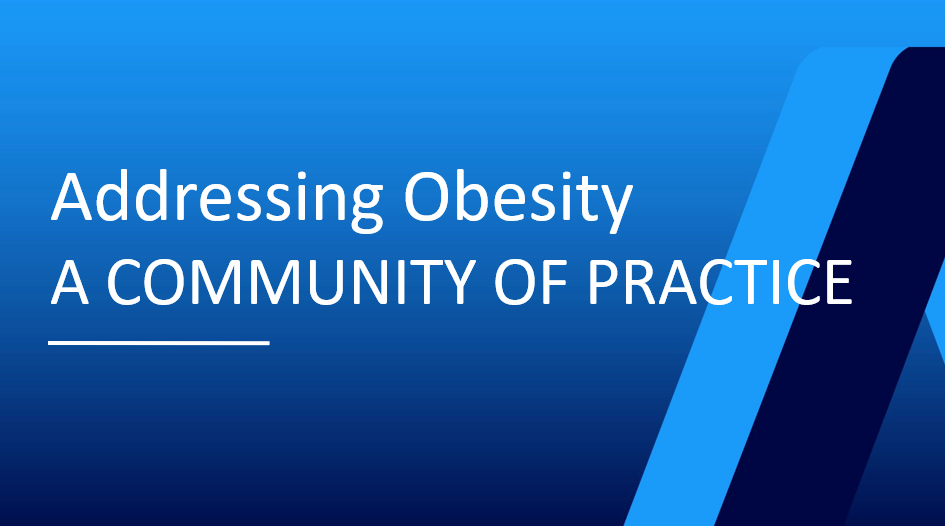
Part of a series of activities on Addressing Obesity: A Community of Practice, this interactive real-world experience patient scenario will focus on how to interact with a patient about obesity when assessing current levels of physical activity, preferences, and limitations.
Member: $0.00
Non-Member: $0.00
0.25 AAPA Category 1 CME credit

Part of a series of activities on Addressing Obesity: A Community of Practice, this interactive real-world experience patient scenario will focus on how to interact with a patient about obesity when engaging in shared decision-making around treatment options.
Member: $0.00
Non-Member: $0.00
0.25 AAPA Category 1 CME credit

Part of a series of activities on Addressing Obesity: A Community of Practice, this interactive real-world experience patient scenario will focus on how to interact with a patient about obesity when discussing weight history.
Member: $0.00
Non-Member: $0.00
0.25 AAPA Category 1 CME credit

Treating patients with obesity is more than a science; it is an art. Unfortunately, healthcare practitioners often overlook treating obesity due to its complexities including medical, physical, psychological, age, and socioeconomic barriers. Among the most challenging patients are those in the geriatric population, low-income population, and those with cultural differences. Bariatric surgeries, brand name medications, exercise programs, and meal replacements or strict dietary programs are usually not an option for these communities. Recognizing these barriers is important in order to develop alternative treatment plans needed to successfully treat obesity in these complex patients.
Member: $0.00
Non-Member: $0.00
1.00 AAPA Category 1 CME credit

Management of diabetes has become a rapidly changing practice. With the recent advancements of new medications, updates in cardiovascular guidelines, and evolution of diabetes technology, it can be difficult to stay abreast on the latest advances, updates, and guidelines. This presentation will review key, pertinent literature and guidelines most applicable to clinical management of diabetes in the outpatient setting. This activity will cover updates in diabetes medications (including cardiovascular and renal guidelines), updates in diabetes technology (including continuous glucose monitors, insulin pumps, and wearable insulin delivery patches), and a highlight of key updates to the ADA Standards of Care 2023.
Member: $0.00
Non-Member: $0.00
1.00 AAPA Category 1 CME credit

Burnout is happening more rapidly in the changing world with even some new graduates questioning their chosen profession. Work-life balance (WLB) is essential for optimal mental health. Clinicians need to feel their best to be the best version of themselves, for their families, and their patients. Accomplishing WLB requires setting boundaries, self-care, stress management, and permanent lifestyle changes.
Member: $0.00
Non-Member: $0.00
0.75 AAPA Category 1 CME credit

Malnutrition syndromes are being encountered with increased frequency in PA clinical practice across a wide range of medical specialties. This activity focuses specifically on the unique nutritional needs of older adults. Participants will learn how to a
Member: $0.00
Non-Member: $0.00
1.00 AAPA Category 1 CME credit

Nutrition is integral to overall patient health and well-being. Orthopedics has not traditionally placed an emphasis on nutritional intake and its effects on pre- and post-operative patients; however, research shows the importance of its role in the speed of recovery and as well as decreased complication rates. By implementing best nutritional practices into the flow of orthopedic practice, we can both enable overweight patients to obtain transformational surgeries while optimizing recovery and the ability to return to physical activities.
Member: $0.00
Non-Member: $0.00
1.00 AAPA Category 1 CME credit

Learning about the pillars of obesity management is one thing. Taking this information and applying it in clinical practice is another. In this activity, participants will learn how to incorporate essential components of obesity management, such as ordering diagnostic tests and labs and managing pharmacotherapy as well as integrating lifestyle components such as nutrition and physical activity, into a comprehensive obesity program. It will address the logistics such as frequency of follow-ups, length of visits, as well as billing and coding to make the education that PAs have gathered during the obesity track actionable and clinically applicable.
Member: $0.00
Non-Member: $0.00
1.00 AAPA Category 1 CME credit

Managing diabetes consumes large portions of PAs’ time and energy and is a "part-time" job to people with diabetes (PWD). With U.S. annual diagnosed diabetes numbers at a staggering 11% of the population and 38% with pre-diabetes, generating a therapeutic alliance supporting lifelong learning and patient empowerment models is essential. This is a two-way street. Diabetes Self-Management Education and Support (DSMES) provide an evidence-based foundation empowering PWD to navigate self-management decisions and activities. DSMES is a cost-effective tool proven to improve health behaviors and health outcomes for PWD, yet its use is sub-optimal with less than 5% of Medicare beneficiaries and about 7% of privately insured using it. Why the low utilization? PAs must examine our role in empowering patients’ decision-making as “we are not always there,” to guide them. Learn how DSMES improves clinical time management while improving diabetes outcomes. Be part of the solution.
Member: $0.00
Non-Member: $0.00
0.75 AAPA Category 1 CME credit